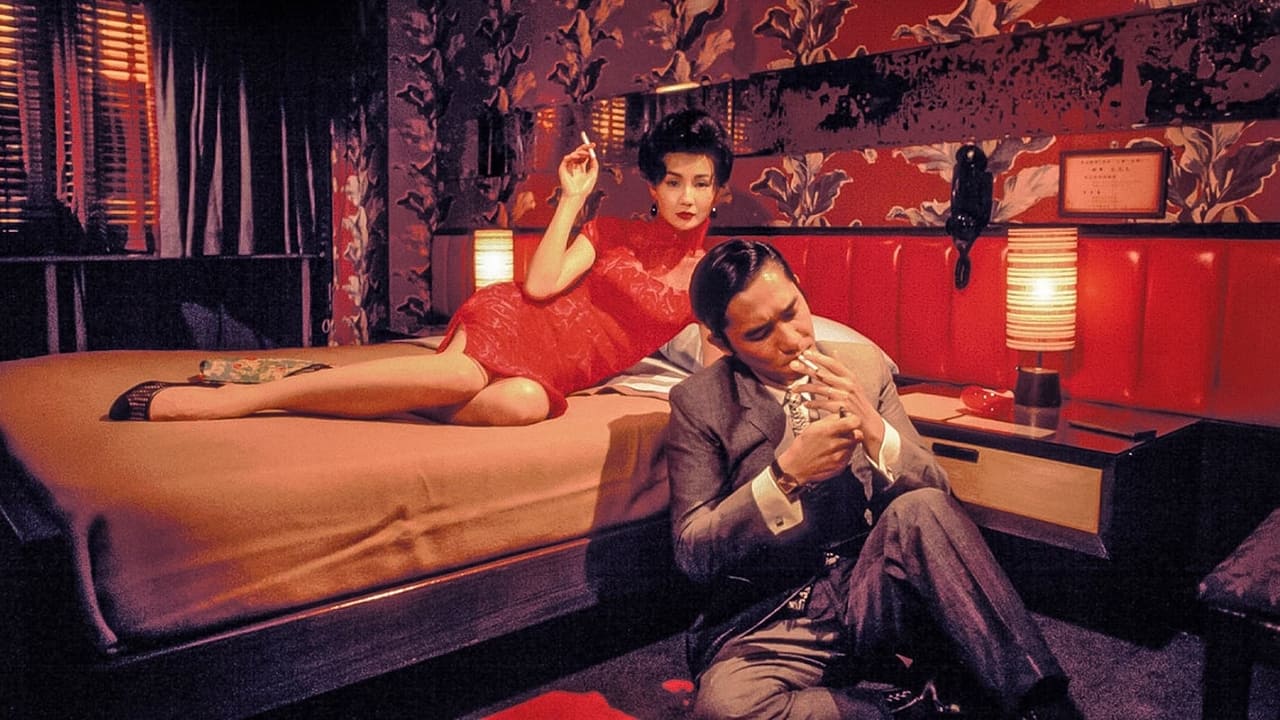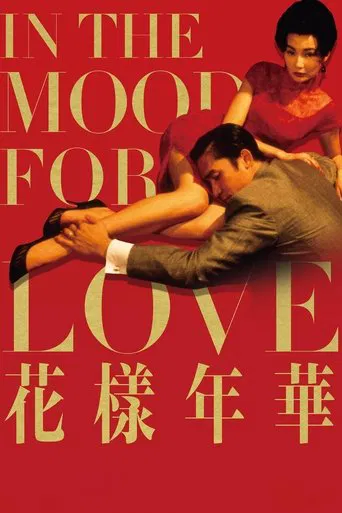

In the Mood for Love (2000) Kar-Wai Wong has indeed created a masterpiece here. Not only created it but orchestrated it. I cannot think of a more accurate word to describe what he did here. "In the Mood for Love" should be included in the definition for mise-en-scène. I suspect that everything was deliberate. Every angle, every camera movement, every color choice, every glance, every song, every word. It was a slow film, yes. But for once, it does not feel that way. It feels that it had to be exactly the pace it was. Prepare to be charmed, intoxicated, mesmerized, transported. I have to be honest, I have not seen this for the longest time because I was convinced that it was another art film that was completely overrated. This time, it was warranted. The camera work. The movement. We peek around edges, we peer through holes, we pan across hallways, we zoom into apartments. We are able to see into the neighboring apartments, as each of them sits, lonely. As we pan back and forth, a wall reminds us. Almost the entire time, the photographer in me was admiring what great angles these were and imagining myself taking them; making a move to take a still every few minutes. The music. The only other film I remember that uses one song so stylistically is Garci's "Volver a empezar" from 1982- which in my opinion was overused and became annoying at some point in the film. Here, it is Yumeji's Theme. In contrast, Wong mixes it up on the score and we do not tire of the theme. Instead, it signals yet another emotionally intense scene filled with longing, waiting, loving, wishing. This is the power this film has. To elicit so many emotions with a few minutes, a handful of glances, one song. The costumes. Most notably, Mrs. Chan's dresses. Ever changing, ever gorgeous. The set design. Oh, the lush and saturated colors. If one can call colors yummy, now is the time. We are almost exclusively indoors. It seems that every time we are outside, it is raining. The lovers run to get out of the rain, they wait for the rain to pause, they talk in the rain. Alas, no kissing in the rain. My complaints? I wish the film was in Mandarin, not Cantonese. For two reasons. One is selfish, because I would be able to understand it without subtitles trying to accurately translate. Two, Mandarin is a less harsh, more fluid language. As far as beauty goes, it would have matched the film's tone better. I also feel as if the film was lacking character depth. That I still felt so much for them, therefore, is even more a testament to Wong's skill. I felt like I did not really know them; that I knew little more than the them strangers saw. Although this may have been a stylistic choice, that does not change the fact that I was left feeling like something was missing. "In the Mood for Love" is as much about what we do not see and what is not said. Silences mean everything. One glance tells us more than words ever could. A minute shift in tone makes all the difference. For example, we never see the adulterers, Mr. Chan & Mrs. Chow. They remain off screen as other characters talk to them. We spend full moments focused on a character's face, watching them as they begin to cry or as they struggle internally. Missed opportunities. Missed moments. Misunderstandings. Misconceptions. Wrong place, wrong time. A theme Wong uses in much of his work, such as "Chungking Express" (which I did feel was completely overrated). Wong was in the mood for love. The audience is in the mood for love. Mrs. Chan and Mr. Chow are in the mood for love. She might not admit it, but Mrs. Chan is in the mood for love. Mr. Chow is in the mood for love. Alas, still no love. He calls her. "It's me. If there's an extra ticket... would you go with me?" No answer. Later in the film, their roles are reversed. She wants to know, "It's me. If there's an extra ticket... would you go with me?" Ironically, it is this film about a love that could be but never was that is named as the most romantic by many. This is one of the reasons I appreciated the film. Had this been filmed in this country, I can almost guarantee you the two of them would have ended up together. Wong did not take the easy way out. Not throughout the film- where he focused on the two being cheated on rather than the ones doing the cheating- and not in the ending, where they continued missing each other, over the years. He garners my respect for this decision. Because this is closer to reality. Often times, love is not enough. Life gets in the way. Circumstances, miscommunications. Excuses, maybe. But that is life. Unfortunately. Some gems of relationship truth: "I didn't know married life would be so complicated! When you're single, you are only responsible to yourself. Once you're married, doing well on your own is not enough." Mrs. Chan asks, "Why didn't you call me today?" "I was afraid you won't like it," Mr. Chow replies. Her response? "Then don't call me ever again." "In the old days, if someone had a secret they didn't want to share, they went up a mountain, found a tree, carved a hole in it, and whispered the secret into the hole. Then they covered it with mud. And leave the secret there forever." This is something Mr. Chow says to his friend Ah Ping. In the exquisite final scene, filmed in Thailand with "Angkor Wat Theme" playing, we see him peering into a hole; we then see it covered as he walks away. From right after the title cards: "It is a restless moment. She has kept her head lowered to give him a chance to come closer. But he could not, for lack of courage. She turns and walks away." From right before the end card: "He remembers those vanished years. As though looking through a dusty window pane, the past is something he could see, but not touch. And everything he sees is blurred and indistinct." Mrs. Chan says, "You notice things if you pay attention." Indeed. The perfect tip to truly appreciate "In the Mood for Love".
... View MoreThis is a snore-fest from start to finish. Anyone who claims this is good must be the kind of person that stares at a blank white painting and claims it inspires them. I gave it 3/10 because 1/10 and 2/10 is reserved for truly terrible movies, and at least the acting was good in this.
... View MoreI have put off writing this review for so long but I felt that I could not go on longer without paying this movie tribute. This is also my first review on this site. I didn't even intend to write it in the first place, because until now, I still don't believe my words will do justice to the sheer beauty of this movie.The first thing that catch your eyes when watching the movie is probably Mrs. Chan's "cheongsam". This also seems to be all women's sole costume choice throughout the entire movie. The "cheongsams" are elegantly designed, highly complementing of Maggie Cheung's lithe body, for it accentuates every curve and edge of the body. Mrs. Chan, like her dresses, is always immaculate, in her hair, her graceful gait. All of this deliberately adds to the sensuality of the movie, without being crude. Moreover, the "cheongsams" also indicate time pass by, every time a new one appears on-screen, we know it's a new day.The next thing that is highly prevalent and which I greatly revelled in is the use of window shots. The brilliant use of this techniques creates a sense of observation to viewers. It felt to me that I was watching something secretive yet enticing in its own way, and the general mood this technique actuates is simply beautiful.There are a lot more, my words do not do any justice to this movie, the use of colours, slow shots, silhouettes, the soundtrack (Oh how I love the soundtrack)... The absolutely breath-taking corridor sequence, the brilliantly filmed conversation in the restaurant (I had never witnessed a more consummate handling of a scene). This movie is incredibly, heart-throbbingly sensual, yet, there was never a need for an explicit act of sexuality.As I once said on Quora, while I was watching this movie, there was a lump in my throat, a swell of almost overwhelming emotions and sentimentality in my body that felt like on the brink of bursting out, yet it did not, and for the first time in my life I felt frustrated and defeated that I don't have the command of as intricate and sophisticated wording as writers like Vladimir Nobokov, so my words simply will not do In The Mood For Love any justice.
... View MoreThis movie tells a simple tale: a woman and a man whose spouses have an affair come to each other for consolation. They slowly develop feelings, but decide to part in the end all for the greater good. However, what makes this movie such a masterpiece does not lie in the story, but rather in its effortless capability to convey emotions and mood. We are put in the main characters' perspectives throughout the movie.The characters' desire, pain, empathy and connection can be felt through still images and camera movements. Every frame tells its own story. The long, silent shots create a sense of longing and loneliness. Subtle body movements - sideways glances, slowly intertwined hands, the way they weigh their questions and drop their eyes or repetitive actions and conversations are never boring, because they make the audiences yearn for more.This movie is utterly delicate, beautifully layered, masterfully crafted to be brimful with feelings. It is slow-burnt with little actions and offers no resolution; but remain one of my most favorite romantic movies of all time for its lush cinematography and the way it tells a tale of noble unrequited love that could have been, but never was.
... View More